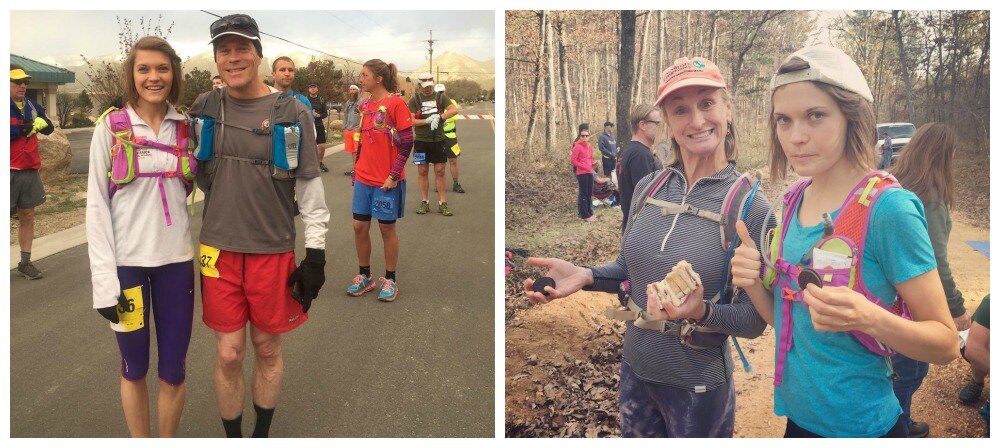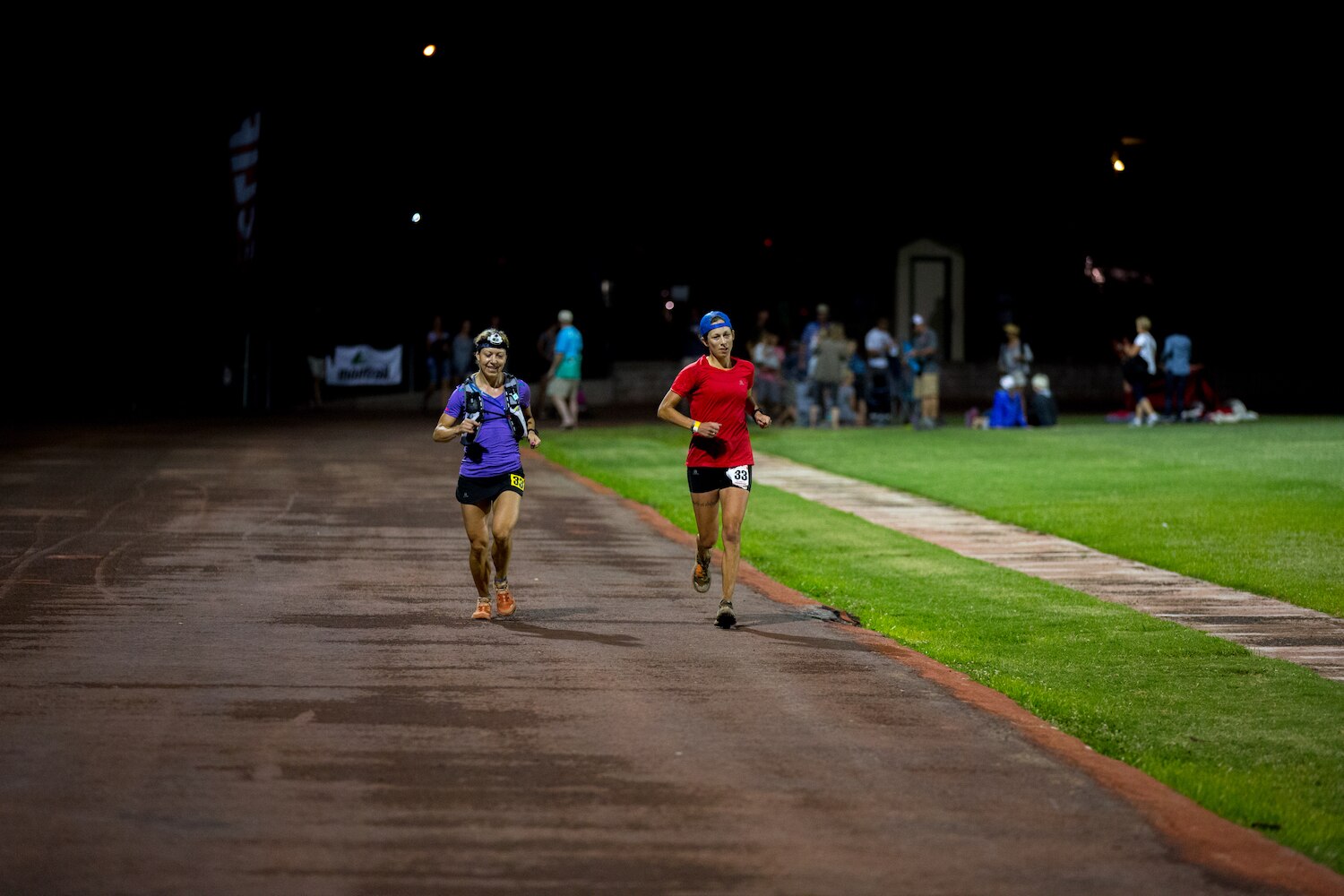Training yourself for a race is something of a science. Pacing someone else is something of an art. It requires giving up your time, your energy, your comfort—even, at times, the workout you expected—for the sake of someone else's goal, the denouement of which will bring you no personal glory even though it could not have been done without you.
For the uninitiated, "pacing" is the act of tailing a runner to help them stick to their race plan, stay positive and follow the marked trail. A competing runner typically has several pacers who take turns throughout the race. Pace-setting is but one element of crewing, which delineates the full package of racer care, including prepping food and gear, cheerleading and tending to the racer's medical (and emotional) needs at aid stations.
And like any element of crewing, pacing is an essential, if not heroic, behind-the-scenes job requiring mental fortitude, preparedness and a good sense of humor. Short tempers won't do; to pace, you need an ultra-long fuse.
The Hackers, who have been crewing as a family for nearly 20 races over the course of two decades, might as well have those descriptors printed on a set of matching business cards.
Rob Hacker has been running the longest—eight 100-mile finishes and a dozen 50-milers and 50Ks. As such, he's had his fair share of pacers. At the 2009 Hardrock, he benefitted from the expert pacing of a British acquaintance named Richard, who was so meticulous that he even monitored the color of Rob's urine (darker shades indicate dehydration).
Even so, Rob maintains that best pacer he's every had is his wife, Cristi Hacker, for her permanent smile, selfless disposition and laser-focused attention to detail. Cristi was originally a cyclist (she raced for the University of Colorado) and started running sometime after graduation. Though she has no 100-mile aspirations herself, she's paced Rob in every 100 he's run, including his first: the Leadville 100 in 1993.
Ellie, now 20, finally conquered her first hundo this year, though she's been crewing all her life. She first paced her dad at Hardrock when she was 14 years old, doing everything from keeping track of trail markers to steering him over a hallucinatory bridge crossing.

No matter how strong your runner may be, he will falter. And in the dark, under the watchful stars and the distant sky, under the weight of 90 miles, roles flipped and Ellie found herself caring for her father. "It was such a weird experience. You're going up this pass in the middle of the night together, and you're responsible for this person," she said.
At one point he thought he heard a troll under a bridge. "There's something under there," he remembered saying. "You go first." And Ellie did, leading her dad across the wooden slats to safety.
She's had her own hallucinations."There were a lot of witches in Arkansas," her dad teased. She nodded gravely.
It's hard to predict how your mind and body will react to the exhaustion of a long trail race. That's why pacers exist. It's a time-honored tradition of keeping runners from wandering off into the bushes, laying down for a nap mid-trail, or giving up on their goals.
A good pacer is invaluable. Here's how to be one.
Know What to Expect
"There's an advantage to getting to know your runner and knowing what their strengths and weaknesses are," said Rob. He recommends doing two or three 30-mile runs together to practice getting pace and nutrition dialed.
It also helps to get your head around the other person's psychology.
"It can be hard to pace someone you're not close with because the lows are so low," said Cristi. Talk to your runner about how they act under pressure and exhaustion. And when they hit a low, reserve judgment and don't take snappy comments too personally; it's hard to be polite after mile 65.
Play by the Rules
If a pacer breaks a rule, the runner gets disqualified. Meet beforehand to talk about race rules—when the pacer can jump in, whether or not "muling" (carrying the runner's stuff) is allowed, etcetera—as well as the runner's personal preferences. Does he or she want you to run in front or behind? Should you tell stories and sing songs or shut the hell up?
"When I ask someone to pace me, I have some expectations. We discuss my goals for the race and what my time should look like," said ultrarunner Aliza Lapierre. She's known for setting course records across the Eastern Seaboard, and she's placed among the top 10 women in Western States four times.
"It's important to make sure you're on the same page so the pacer doesn't get overzealous and take off sprinting," she said. The worst pacer she's ever had did just that. "I had run 70 miles and wasn't feeling quite as energetic as he was, and I had to keep yelling at him to come back. He also had all my water and fuel, so that was pretty aggravating."
Pack Carefully
When TRP contributor Morgan Tilton paced her first ultramarathon, the 2016 Leadville Trail 100, her runner had a nutritional drink specially formulated for him. Halfway through their leg together, the sweet taste became nauseating, and he refused to drink it.
"We had a little beef jerky and my water, but all our other foods were sweet. I think it's important to bring a varied palate. You never know how your body is going to react to certain foods the middle of a race," said Tilton.
Everyone has a story about forgetting something. The first time Cristi paced an ultra, her headlamp batteries died in the first mile. Ellie and her dad had to run an extra mile at Hardrock to grab her forgotten gloves. Check your list and check it again; make sure you have everything you and your runner need before taking off.
Look Out for Number One
Being asked to pace someone is a tremendous honor, and it's easy to lose sight of yourself in trying to do the best job possible. Then there's the hubbub, the sleep deprivation of a two-day competition and the nervous jitters.
"You're so exhilarated by the experience, you can forget to take care of yourself," said Tilton. She recommends getting a good meal two hours before you start running and remembering to track your own hydration and calorie input as you pace.
You should also make sure you're fit enough for the job. Pacing for 10 miles? Train until that distance is a walk in the park.
Be Ready to Sacrifice Your Comfort for Your Runner
Cristi, the ultimate pacer, has been known to give up her own pants to runners in need. "She's totally selfless," said Ellie when asked what made her mother the master. "That's what it's all about. It's the runner's race, and the pacer's job is to do everything they can to help the runner do their best."
That means tending to emotional needs as well as physical ones.
One of Lapierre's best pacers earned that title for his optimism. "He was very encouraging and upbeat, and that was contagious. It brought out the best in me," she said.
The takeaway: Remind your racer to eat and drink, push food and water when they don't realize they need it and keep a sharp eye out for course markers. Keep your complaints to yourself and remember: You're here for the runner, and while your safety is a priority, your comfort comes second.
Know When It's Time for Tough Love
Your runner is miserable. His whole body hurts, and he wants to quit. Think of what his mom would say to him. Then think of what his ex-Marine high school basketball coach would say. Aim for the middle. "You have to have a little bit of sympathy but be hard at the same time," said Lapierre. "One of my best pacers responds to my complaints by saying, 'I'm sorry about that. Tell me at the finish.'"
Your runner might not be too jazzed at the time, but they will be when they cross that finish line.
Interested in pacing or learning more? Try the Hardrock 100 matchmaking spreadsheet, the Leadville 100 Pacer Guide, or the Facebook groups of other races to get involved.
